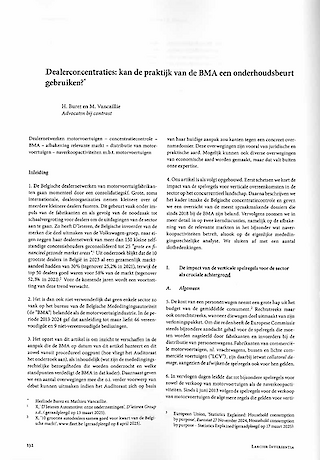In the Picture

Be careful when it comes to your Belgian distributor
October 2015Imagine…
. . . that an internal study has demonstrated that your current distribution set-up in Europe is seriously out of date. High-end products have to be offered in optimal conditions, and right now that simply is not the case. A good indicator is that your costs for repairs under warranty have never been so high. So you bite the bullet and decide to reorganize your distribution system throughout Europe, with the goal to make it better and more efficient.
One of the less pleasant but unavoidable aspects of this endeavour is that you are going to have to say farewell to a number of your current distribution points. They have unlimited-term distribution contracts, but fortunately those contracts contain a clear provision that allows you to terminate them at any time – subject to a 1-year notice period.
When you give notice to the Belgian distributor, he immediately serves you with a formal notice of default and demands a compensation in lieu of advance notice and even a clientele compensation. You can scarcely believe what you are reading. The contract does not say a word about a clientele compensation, and you carefully respected the contractually-provided 1-year notice period. However, the distributor persists, and refers to mandatory Belgian playing rules – yet the contract provides that Dutch law applies. So the distributor´s reference to Belgian law would seem to be way off the mark . . .
Or do you nevertheless have reason to be worried?
A brief clarification
In Europe, Belgium is the undisputed champion in protecting distributors with unlimited-term distribution contracts. In an international context, therefore, special attention always needs to be paid to this issue.
The Belgian rules for terminating certain types of unlimited-term distribution contracts were recently incorporated into the new Economic Law Code (title 3 of Book X).
This covers the following types of distribution contracts:
- The distributor is exclusively appointed; or
- The distributor sells virtually all of the products in the area (de facto quasi-exclusivity); or
- The contract imposes important obligations that are strictly and specifically linked to the distribution contract and as a result of which the distributor suffers substantial disadvantage in the event that the distribution contract is terminated.
No special protection applies for the distributor if none of these criteria is fulfilled. If so, the normal contract law applies. The contractually-provided notice period is binding and there is no legal basis for a “goodwill” compensation.
The special protection shall apply if any one of these criteria is fulfilled and the contract is for an unlimited term. Be particularly cautious on this latter point, because limited-term contracts turn into unlimited ones (and thus enjoy the legal protection) if the distributor was not terminated by registered letter between 6 and 3 months prior to expiry of the term. Limited-term contracts that (whether or not slightly modified) are renewed for a third time also enjoy legal protection just as if they were unlimited-term contracts.
What exactly does this legal protection entail?
First and foremost, protected distributors (except in the event of serious fault or an express resolutory clause) can only be terminated subject to a reasonable notice period. The law does not define what a "reasonable" notice period is, so the determination has to be done by the judge on a case-by-case basis. Most of the case-law refers to the period that is reasonably necessary for the distributor to reorient his activities and find an equivalent source of income (e.g. to find a different supplier or to further develop the business with other existing suppliers). If the supplier has not given a reasonable notice period, the distributor has the right to a compensation in lieu of advance notice.
The distributor can also be entitled to a “fair additional compensation”, namely for personnel termination costs (so-called “smart money”), certain costs that the distributor incurred within the framework of the distribution contract and, most importantly, for built-up clientele (“goodwill”).
The law provides three cumulative conditions for the right to a clientele compensation: (i) there has been a significant clientele added value via acquisition of new clients or growth of business with existing ones; and (ii) this added value came about through the efforts of the distributor; and (iii) the supplier will continue to enjoy benefits from this clientele after the end of the contract. Just like the right to a reasonable notice period, the assessment of the right to goodwill is performed by the judge on a case-by-case basis, if the parties fail to reach an agreement on their own - which is quite often the case.
Nature of these rules
From a legal perspective, this protection is a most remarkable creature. Technically speaking, Belgium considers the special protection offered as overriding mandatory provisions if the distribution contract relates to the Belgian territory. When a Belgian judge is confronted with a protected contract, he must apply Belgian law even if the distribution contract explicitly provides that the law of a different country (in our example: the Netherlands) should govern the contract. In addition, the law makes it quite easy for the distributor to submit a dispute to the Belgian judge.
Concretely
When reorganizing a European distribution network, it is by no means a luxury to pay special attention to the distributor who has been appointed for Belgium, because he might well enjoy special protection in the event of termination. This protection can cause surprises and lead to long drawn-out proceedings, often with the appointment of an expert. So be sure to carefully consider the following points:
- Is the contract of the type to which special protection applies?
- Is there an express resolutory clause that you can invoke?
- If the contractually-provided notice period has been given, it is up to the distributor to demonstrate that this period is not long enough to secure an equivalent source of income.
- If the distributor asks for a clientele compensation, insist that he furnish the objective elements from which it appears that the cumulative conditions for obtaining such a compensation are really fulfilled.











